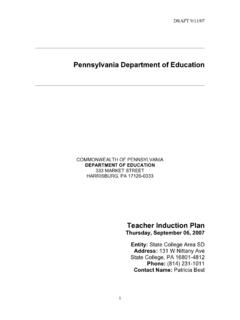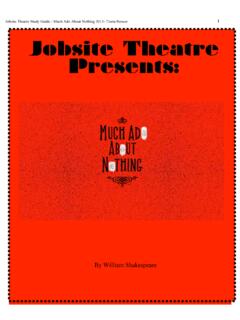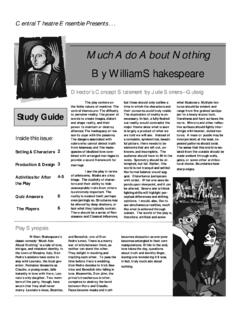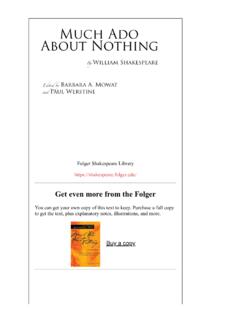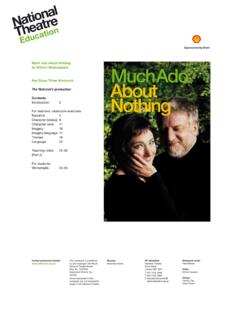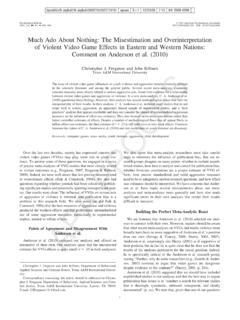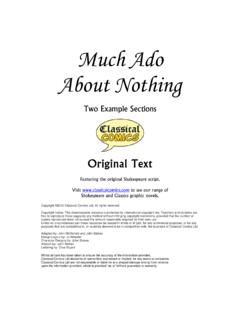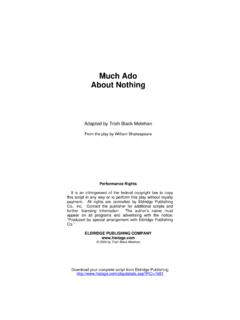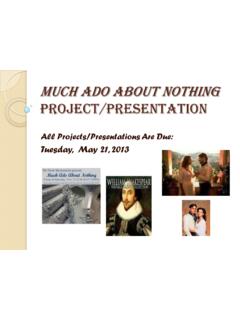Transcription of Much Ado About Nothing Writing Prompts
1 much Ado About Nothing Writing Prompts much Ado About Nothing is a comedy of love and marriage. Naturally, marriage has changed quite a bit since Shakespeare s time, or has it? And has love changed? Following is a list of questions. Read them over and spend two typed (double-spaced) pages responding to any or all of these. This is due 3/12 1. Men and women should marry persons of a similar social and economic status as themselves. 2. People choose with whom they will fall in love. 3. It is better not to marry than to marry and risk being cheated on by your spouse. 4. Most people can be trusted to be faithful in marriage. 5. Men are attracted to women who are assertive and bold. 6. Jealousy in a romantic relationship is usually a sign the relationship has problems. 7. Because parents usually know what is best for their children when it comes to choosing a mate, children should go along with their parents' wishes in this regard.
2 STUDENT RESPONSE Prompts The following activities are designed to prompt student response at the knowledge, comprehension, and application levels. Journal Writing At the beginning of each class, give students a list of quotes from which to choose one quote and write their personal response for five to seven minutes. After Writing , students can share their responses in pairs, small groups, or with the class. Or, one day each week can be set aside for students to choose their best response and share it in small groups or with the class. Their responses can take many forms. Write a three part response: 1) indicate the meaning of the quote, 2) connect the quote with other parts of the play, other literature, or personal experiences, and 3) discuss your personal feelings About the quote, the character, or the action. * Write a purely personal expression.
3 Take off from the quote and freewrite wherever your thoughts may take you-into fantasy, reflections on your day, problems you are experiencing, or people you care About . Write a poetic response. Write your own rejoinder or rebuttal to the quote or continue the dialog using Shakespeare's style. Or, write a poem reflecting a theme or idea suggested by the quote. Copy the quote and illustrate it. In lieu of Writing , draw the characters or illustrate the action in whatever detail you like from symbolic representation to realistic characterization. Reply to the character. Write a letter to the character, either from your point of view or from the point of view of another character in the play. The following quotations provide rich possibilities for student response: Act I 1. "There is a kind of merry war betwixt Signior Benedick and her.
4 They never meet but there's a skirmish of wit between them." (I, i, 58-61) [p. 35] 2. "Because I will not do them the wrong to mistrust any, I will do myself the right to trust none; and the fine is (for the which I may go the finer), I will live a bachelor." (I, i. 233-237) [p. 41] 3. "It must not be denied but I am a plain-dealing villain." (I, iii, 29-30) [p. 46] Act II 1. "I have a good eye, uncle; I can see a church by daylight." (II, i, 81-82) [p. 51] 2. "Friendship is constant in all other things Save in the office and affairs of love. Therefore all hearts in love use their own tongues; Let every eye negotiate for itself And trust no agent; for beauty is a witch Against whose charms faith melteth into blood." (II, i, 173-178) [p. 54] 3. "I have known when there was no music with him but the drum and the fife; and now had he rather hear the tabor and the pipe.
5 " (II, iii, 12-15) [p. 64] Act III 1. "I'll devise some honest slanders/ To stain my cousin with. One doth not know/ How much an ill word may empoison liking." (III, i, 84-86) [p. 76] 2. "If I see anything tonight why I should not marry her tomorrow, in the congregation where I should wed, there will I shame her." (III, ii, 119-121) [p. 81] 3. "Yet Benedick was such another, and now is he become a man. He swore he would never marry; and yet now in despite of his heart he eats his meat without grudging. And how you may be converted I know not; but methinks you look with your eyes as other women do." (III, v, 84-89) [p. 91] Act IV 1. "You seem to me as Dian in her orb, As chaste as is the bud ere it be blown; But you are more intemperate in your blood Than Venus, or those pamp'red animals That rage in savage sensuality." (IV, i, 56-60) [p.]
6 96] 2. "I love you with so much of my heart that none is left to protest." (IV, i, 284-285) [p. 103] 3. "I cannot be a man with wishing; therefore I will die a woman with grieving." (IV, i, 320-321) [p. 105] Act V 1. "Men Can counsel and speak comfort to that grief Which they themselves not feel; but, tasting it, Their counsel turns to passion" (V, i, 20-23) [p. 110] 2. "No, I was not born under a rhyming planet, nor I cannot woo in festival turns." (V, ii, 40-41) [p. 122] 3. Benedick: "Your niece regards me with an eye of favor." Leonato: "That eye my daughter lent her; 'tis most true." Benedick: "And I do with an eye of love requite her." Leonato: "The sight whereof I think you had from me, From Claudio, and the Prince." (V, iv, 22-26) [p. 127] 4. "One Hero died defiled; but I do live, And surely as I live, I am a maid.
7 " (V, iv, 63-64) [p. 128] 5. "Since I do purpose to marry, I will think Nothing to any purpose that the world can say against it; and therefore never flout at me for what I have said against it; for man is a giddy thing, and this is my conclusion." (V, iv, 104-108) [p. 130] Oral Response Students can be guided to deeper levels of understanding of the play through small group or class discussion. Once the plot is understood by the students, their responses can focus on analysis and evaluation. The oral response questions suggested below can also be used as student Writing Prompts . General Questions What is Shakespeare telling us About ourselves- About what we want or need to be happy, About how men and women need to interact? What is Shakespeare's understanding of human nature? Is the play true? Was the play realistic in terms of how people lived in Shakespeare's time?
8 Is it realistic in terms of the way people behave today? Act I Why is it significant that Don Pedro and his men are returning from the wars? Why does Beatrice ask About Benedick? What is the "real" reason? Beatrice and Benedick say that lovers are fools, and they want Nothing to do with love. Why do you think they say this? How does Benedick react to Claudio's declaration that Hero is "the sweetest lady that ever I looked on"? Why does Claudio send Don Pedro as his emissary to Hero to declare his love? Why does Don John want to cause trouble? Why is he so morose? Act II What are Beatrice's reasons for not wanting to have anything to do with men? What are Leonato's instruction to his daughter, Hero, and what do these show About traditional attitudes? According to the stage directions for the dance, Don John is not masked during the revels?
9 Why? Do you think Beatrice and Benedick know each other when they speak behind their masks? Why? Why not? Why does Don John pretend that he does not recognize Claudio? How does Benedick feel About his conversation with Beatrice? What does Beatrice mean when she says, "once before he [Benedick] won it [my heart] of me with false dice"? (II, i, 277-278) [p. 57] Why is Claudio unable to speak when Don Pedro tells him that the Lady Hero is his? Why does Don Pedro's plan work so well? How does Benedick rationalize himself into loving Beatrice? Act III Why do the women praise Benedick so highly when they describe how he loves Beatrice? Why does Hero say that she will not tell Beatrice About Benedick's love? How fair are the women in their description of Beatrice's behavior? Is she too hard on men? (Think back to her description of Don John.)
10 Why are they devoting so much time to her reputation for "disdain"? What is Beatrice's reaction to the women's speech? Why do the men make fun of Benedick? How does Don John plan to deceive Claudio and Don Pedro? Why does the Watch arrest Borachio and Conrade? Act IV How does Claudio judge Hero's behavior when he accuses her? How do the rest of the company react? How can you explain in relationship to their other behavior in the play Leonato's denunciation, Benedick's confusion, and Beatrice's conviction that Hero has been slandered? How does the Friar propose to judge the situation? What does the Friar hope will happen as a result of his plan to have it published that Hero is dead? What kind of change does he think will come About in Claudio? What happens between Benedick and Beatrice? Why does Beatrice want to kill Claudio?





